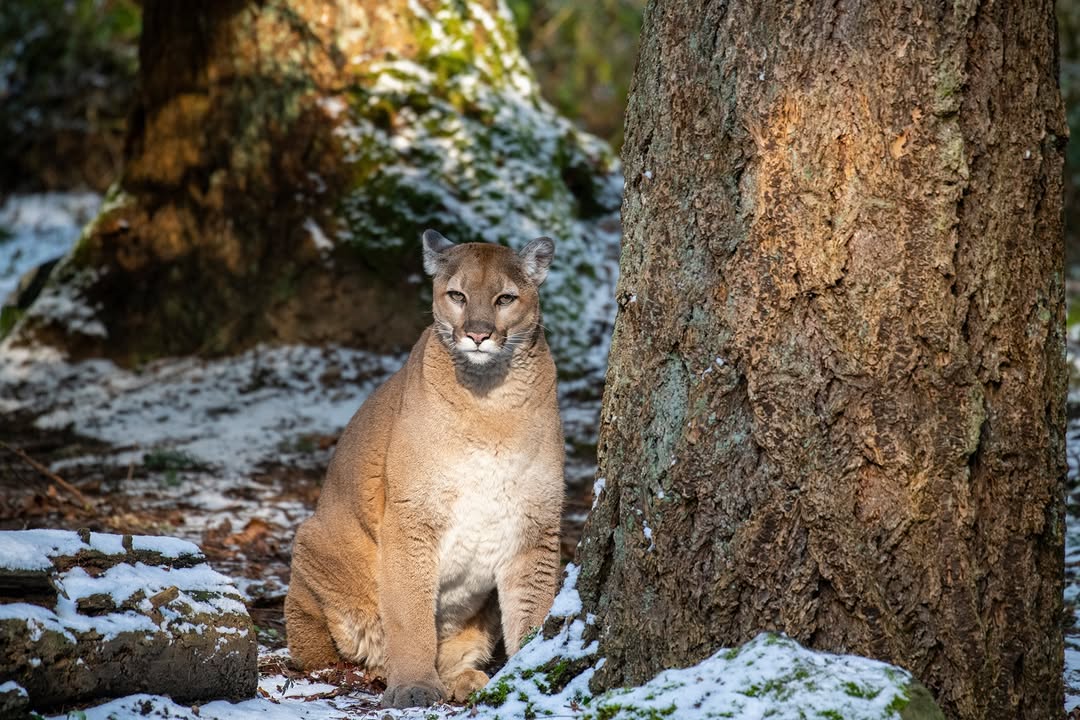- The life and legacy of Carly, a rescued cougar at Northwest Trek, and her role in wildlife conservation education.
- The circumstances leading to Carly’s humane euthanasia following kidney failure and its implications for zoo management.
- Clarification on the cause of Carly’s health decline, emphasizing that it is unrelated to recent cases of Highly Pathogenic Avian Influenza (HPAI).
- The importance of wildlife conservation efforts and the role of sanctuaries in supporting non-releasable wild animals.
- Emotional impact on staff and visitors, highlighting the bonds formed between humans and animals in sanctuaries.
The story of Carly, the beloved 15-year-old cougar, captures both the heartwarming triumph of wildlife conservation and the sobering reality of animal care. Born in 2009, Carly was discovered as an orphaned cub in Washington State. Deemed non-releasable due to her early life challenges, she found refuge at the Northwest Trek, a facility dedicated to the conservation of native species and education. Over the years, Carly became a living symbol of the majesty of nature and the potential of human efforts to protect it. Her presence inspired many who visited, offering insights into the inherent value of wildlife and the ecological importance of cougars in particular.
Carly’s role as an ambassador for wildlife was immense. Her existence in a sanctuary where visitors could learn about large felids enriched people’s understanding of these majestic cats. Cougars—also known as mountain lions, pumas, or panthers—are apex predators that help maintain the balance of their ecosystems. By preying on ungulates and other animals, they play a crucial role in habitat preservation. This indirectly supports biodiversity, fostering healthier environments. Carly’s charismatic presence allowed Northwest Trek to engage audiences about these crucial ecological processes, conservation challenges, and the need for coexistence between humans and wildlife.
Sadly, Carly’s final days were marked by a significant decline in health due to advanced kidney failure. This condition, common in older felines both in the wild and in captivity, often leads to a compromised quality of life. Zoo management teams are tasked with making difficult decisions regarding the well-being of animals in their care. In Carly’s case, humane euthanasia was determined to be the most compassionate course of action, relieving her from further pain and suffering. This decision underscores the ethical responsibilities held by zoos and sanctuaries in managing animal welfare, balancing scientific knowledge with humane care.
In the realm of zoo management and animal care, it is essential to continually adapt and implement best practices. Managing the health of aging animals requires proactive health monitoring and adaptations to care routines. Carly’s situation highlights the importance of comprehensive veterinary checks and the development of specialized care protocols tailored to the needs of individual species and aged animals. These practices reflect broader trends in the field, where innovative approaches to geriatric animal care are increasingly pivotal.
It is crucial to clarify that Carly’s decline from kidney failure was not associated with the recent reports of Highly Pathogenic Avian Influenza (HPAI) found in wild and domestic felids. Misinformation can lead to unwarranted panic and can obscure the true challenges that animals like Carly face in captivity. The explicit separation of these circumstances ensures that focus remains on the genuine health needs and management of wildlife in human care, without unfounded associations to external health crises.
Sanctuaries like Northwest Trek play a vital role in wildlife conservation efforts by providing homes for non-releasable animals such as Carly. These facilities offer a second chance to animals that, for various reasons, cannot survive independently in the wild. This mission includes educating the public about the importance of preserving wild habitats and protecting species at risk. Through programs and initiatives, sanctuaries advocate for ecological stewardship and support global efforts to conserve biodiversity.
The emotional bonds that form between sanctuary staff, animals, and visitors should not be underestimated. Carly had become a fixture at Northwest Trek, and her passing has left a significant emotional impact on those who had the privilege of caring for her and observing her grace. The relationships fostered in sanctuary settings between human caretakers and non-human residents are profound, and they speak volumes about the empathy and dedication required to maintain such environments.
Wildlife conservation is an ever-evolving field that constantly pushes the boundaries of what is possible in ensuring the well-being of animals like Carly. The key lies in constant education, awareness, and scientific progress. The lessons learned from Carly’s life and her story will continue to inspire efforts in the preservation of wildlife, reminding us all of the interconnectedness of life and the shared responsibility of stewardship we hold toward the natural world.
*****
Source Description
We are saddened to share that Carly, our beloved 15-year-old cougar, was humanely euthanized following a decline in health from advanced kidney failure. The rescued cougar came to Northwest Trek after being deemed non-releasable and found as an orphaned cub in Washington State in 2009. Carly was a magnificent ambassador and inspired countless guests about wildlife conservation. Carly was a beloved member of our family, and her loss is felt deeply by our staff and all who had the privilege of knowing her. We extend our heartfelt condolences to everyone who loved and cared for her.
It is of critical importance to note that Carly’s loss is not related to the recent cases of HPAI that have been reported in wild and domestic felids.


